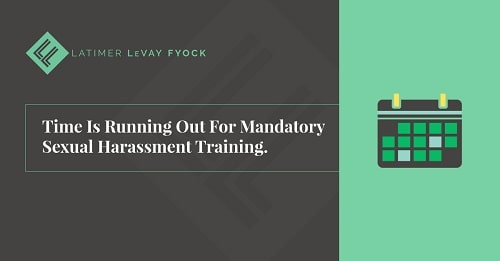Illinois Employers: Time Is Running Out For Mandatory Sexual Harassment Training

Given the unprecedented challenges and upheaval we have seen over the past 11 months, all of us are no doubt looking forward to turning the page on 2020. But for Illinois employers, the rapidly approaching end of the year means that time is running out to satisfy many of their new obligations under the sweeping changes to the Illinois Human Rights Act (the “Act”). This includes conducting and completing mandatory and compliant sexual harassment prevention training for all employees by December 31, 2020.
Even businesses that were previously exempt from the Act - even companies with just one employee - must complete this training because the Act now applies to every Illinois employer. Businesses that fail to comply with the Act’s training requirements by the end of the year will have 30 days to do so or else face civil penalties ranging from $500-$1,000 for the first offense.
Options For Conducting Training
Employers have options when it comes to who will conduct the program and how it will occur. Companies can hire third-parties to provide the needed annual training (at a cost), or they can do it themselves so long as their program equals or exceeds the minimum standards set forth in the Act.
Many companies held off on conducting training earlier this year. The COVID-19 pandemic obviously played a role in such delays. But employers were also waiting on the Illinois Department on Human Rights IDHR) to develop a long-promised model sexual harassment prevention training program that they could use with confidence to conduct compliant training. IDHR released its program over the summer, so employers who haven’t already done so need to either use the IDHR materials or make alternative training arrangements in the few short weeks left in the year.
All Employees Must Receive Training
Employers must provide training every calendar year to all full-time, part-time, and short-term employees, as well as interns. They do not need to administer a program for independent contractors. However, IDHR “strongly advises” that “independent contractors receive training if they are working on-site at an employer's workplace or interact with the employer's staff.”
Additionally, it does not matter whether a company is based outside of Illinois. If it has employees who work or will work in Illinois, those employees must participate in the training.
Minimum Program Requirements
If an employer decides to conduct sexual harassment training on its own, or hires a third-party to do so, the program must contain the following required elements:
- an explanation of sexual harassment;
- examples of conduct that constitutes unlawful sexual harassment;
- a summary of relevant state and federal laws prohibiting sexual harassment and the remedies for violations of these laws; and
- a summary of the employer’s responsibility to prevent, investigate, and correct sexual harassment.
Supplemental Training Requirements For Restaurants and Bars
In addition to the foregoing requirements, restaurants and bars must also provide supplemental sexual harassment prevention training that includes presentations about specific conduct, activities, or videos related to the restaurant or bar industry, as well as an explanation of manager liability and responsibility under the law. Those in the bar and restaurant industry can download and use IDHR’s industry-specific model sexual harassment training program or conduct the program on their own.
Recordkeeping Obligations
The Act requires that employers maintain records affirming that all applicable employees have completed the program in each calendar year. Companies must make such records available for inspection by IDHR upon request. This record, which may be either paper or electronic, can consist of a certificate or a signed employee acknowledgment or course sign-in worksheet.
Questions About Your Sexual Harassment Training Obligations? Call Us Today.
Whatever direction your company takes in terms of conducting mandatory sexual harassment training, there is no more time to waste in getting it done. If you have questions or concerns about your company’s obligations under the revised Illinois Human Rights Act, including sexual harassment prevention training, please contact the employment law attorneys at Latimer LeVay Fyock for guidance and assistance.


